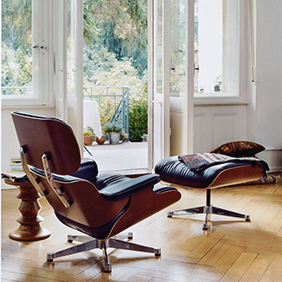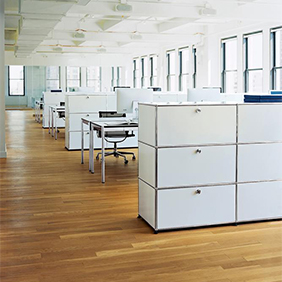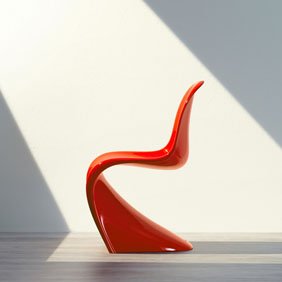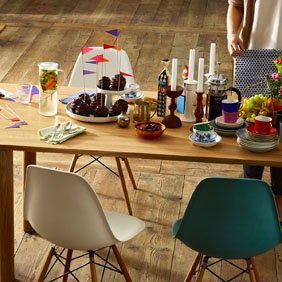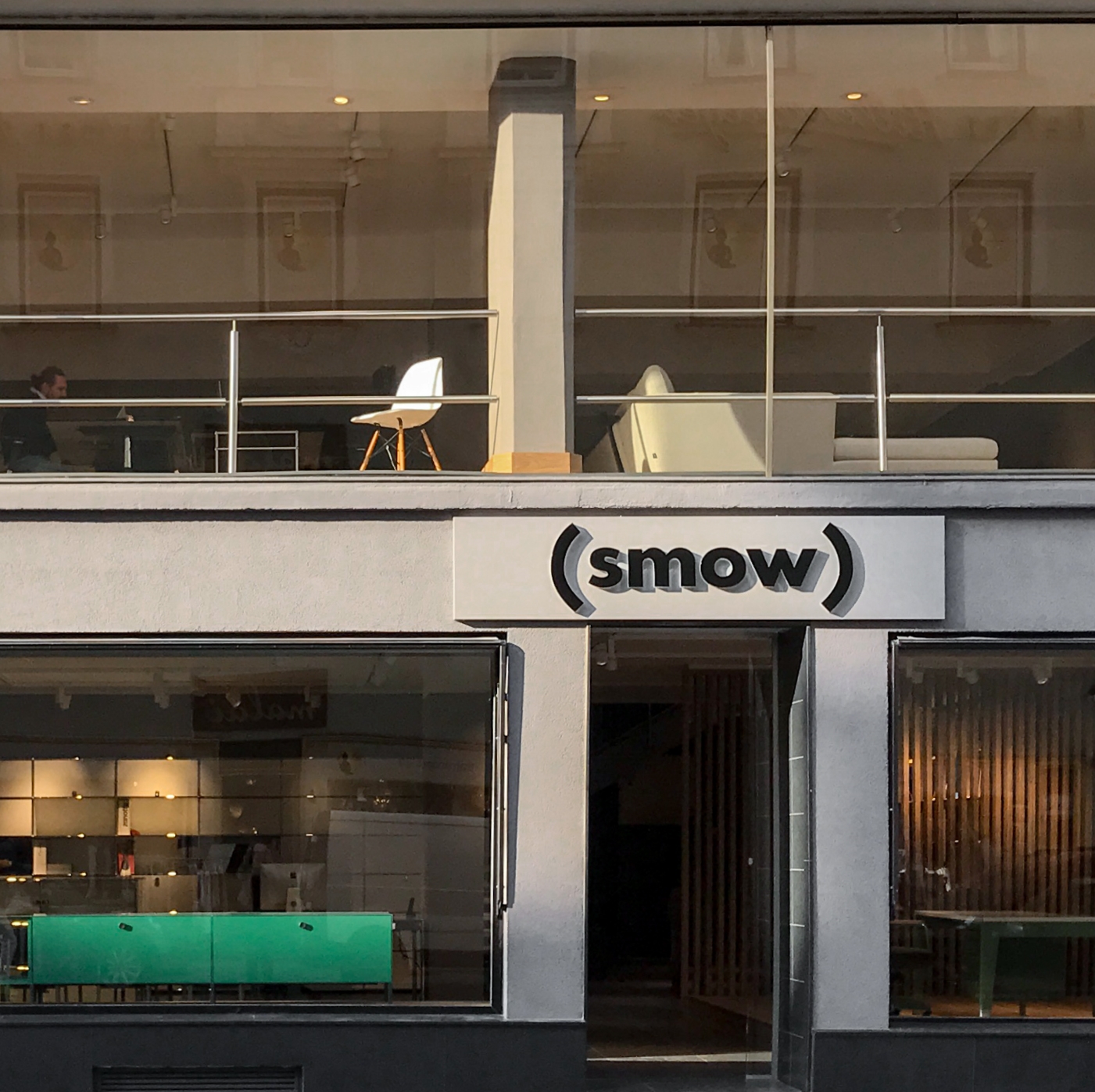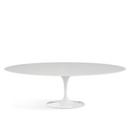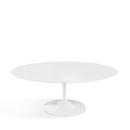Saarinen Round Dining Table
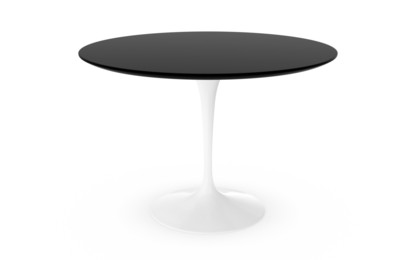
has been added to your wishlist.
Details
| Product type | Dining or conference table |
| Dimensions | Height: 73 cm (laminate/veneer), 72 cm (marble) Table top Ø 91/107/120/137/152 cm Pedestal Ø 51 cm (table tops 91/107/120) or Ø 66 cm (table tops 137/152) |
| Colours | Pedestral  Table top    Other versions of the tabletop are available on request |
| Material | Table top: smooth laminate or Arabescato marble (white with grey tones), high gloss
Pedestal: heavy moulded cast aluminium with Rilsan PLEASE NOTE: Marble surfaces may vary in colour and may include small cracks or holes (so-called taroli). This is a natural property of the material, is the characteristic of the table tops and represents in no sense a fault. 
|
| identification of authenticity | The "Knoll" logo can be found on the table base. The nameplate with the logo "Knoll Studio" and the signature of the designer is also attached under the table top or the tabletop support plate. |
| Care | The surface can be wiped with a soft cloth, with the teak veneer a dry cloth is sufficient, or a slightly damp chamois leather. If necessary, use lukewarm water with a small amount of mild detergent. |
| Sustainability | ISO 14001 |
| Warranty | 24 months |
| Product family | Pedestal Collection |
FAQ
How do I recognise an original Saarinen dining table?
The logo "Knoll" can be found on the underside of the table. A name badge with the logo "KnollStudio" and the signature of the designer is also located either under the table top or on the table top support.
How many chairs fit round a Saarinen dining table?
Ø 91 cm: 3-4 chairs
Ø 107 cm: 4 chairs
Ø 120 cm: 4-5 chairs
Ø 137 cm: 4-6 chairs
Ø 152 cm: 6-8 chairs
The Design
In the early 1950s Eero Saarinen set himself a particular challenge: to do something about the "ugly and restless world" of chair and table legs that existed under dining tables and which he viewed uncomfortably as a chaotic mess. At the end of a 5-year development phase he had developed a collection of one-legged furniture, the Pedestal Collection; a collection which in addition to the endearingly popular Saarinen Tulip Chair also includes a series of oval dining tables ,coffee tables and side tables. The collection's popular "Tulip" description is derived from the visual form so very reminiscent of the beloved flower. The revolutionary thing about the Saarinen Tulip table and the other members of the collection was and is the pillar, a feature which gives the objects a unique and very pleasant visual appearance. And an appearance which in conjunction with the overall very soft, flowing forms and the smooth surface of the Saarinen tables creates very elegant and peaceful furniture objects. Eero Saarinen designed the Tulip Table in 1959 for the American manufacturer Knoll International, who still produce it today in range of sizes and materials.
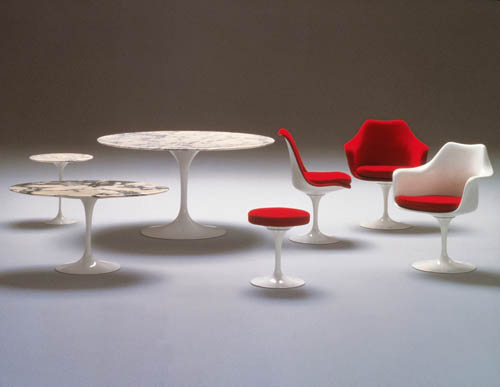
A selection of objects Eero Saarinen's pedestal collection
Designer
Tulip Table designer Eero Saarinen was one of the most famous architects and designers of the twentieth century. Born in 1910 in Kirkkonummi, Finland as the son of renowned architect Eliel Saarinen in 1923 he moved with his family to the United States, where Saarinen was raised on the grounds of the Cranbrook Educational Community in the affluent town of Bloomfield Hills, a institution which his father had designed and lead. After studying sculpture in Paris and architecture at Yale Saarinen worked as an architect, joining in 1941 in the architectural firm of his father before establishing his own office in Michigan in 1950. In 1940 Saarinen participated together with Charles Eames in the New York Museum of Modern Art's famous "Organic Design in Home Furnishings" competition, winning first place with their Organic Chairs. Organic form language remained central to the Eero Saarinen canon as beautifully represented by one of Saarinen's most famous pieces of furniture design the ever popular Tulip Chair, an object created to partner the as the Saarinen pedestal table. Eero Saarinen died in 1961, his furniture designs remain as industry standards today.
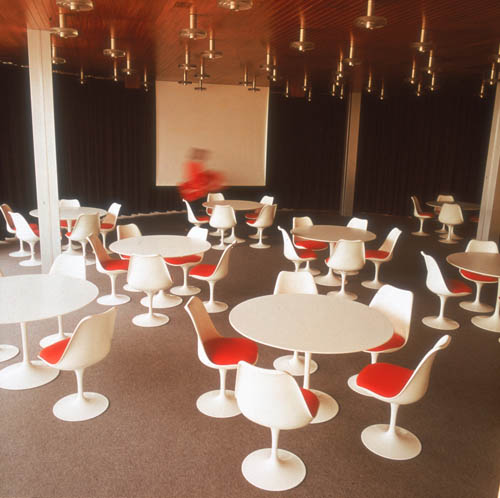
A typical 1960s interior with the Saarinen dining table and Tulip chair
Manufacturer
Founded by Hans Knoll in 1938 Knoll International is today a global furniture manufacturer with production facilities in North America and Italy. Originally based in New York, in the early 1950s production was moved to Pennsylvania. Following Hans Knoll's untimely death his wife Florence Knolls took over the management of the company; however, after just six years withdrew from the Board and was henceforth only active in an advisory capacity. Today Knoll offer their many products over two central platforms in the two product lines: "Knoll Studio" and "Knoll Office". Knoll Studio encompasses furniture for the home and public spaces, while Knoll Office focuses on innovative office furniture systems and office furniture. In addition to modern design classics such as the Saarinen Tulip table, the furniture of Mies van der Rohe or the Wassily chair by Marcel Breuer, Knoll also produce contemporary designs by architects and designers such as Frank Gehry and is represented with its products in numerous design museums around the world. The collection of MoMA New York, for example, has more than thirty objects from the Knoll portfolio.
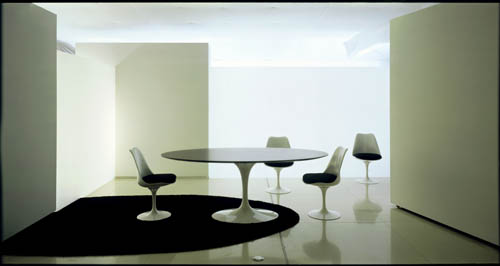
Saarinen dining table and chair from the Pedestal Collection for Knoll
Production
The Saarinen pedestal dining table has been made for over 50 years by the American furniture manufacturer Knoll International. Comprising a base made of heavy cast aluminium, coated with a black, white or platinum coloured finish, the table tops are in turn made of smooth laminate, marble or teak veneer. Available in a 5 different sizes the Tulip table is also suitable as a side table or coffee table. Knoll manufactures its furniture in various locations in North America and in Italy, and always using only selected high-quality materials. During the manufacturing process the company puts great emphasis on environmental responsibility, resource-saving production processes and minimizing waste. Designs such as Knolls Tulip Table are not just excellent pieces of design, but also high quality, durability and environmentally friendly products. Something guaranteed not only by Knolls has many years of experience in producing the Saarinen table, but by the fact the company was involved in its development, and thus perfectly understands what it should be and why.

Eero Saarinen (20.08.1910, Kirkkonummi, Finnland - 01.09.1961, Ann Arbor, Michigan)
Historical Context
The post-war years in the United States were defined in all areas by social changes, changes which also had a significant impact on the designs of the so-called Mid-Century-Modern movement. Rapid advances in technology helped production methods to become more efficient and allowed fro the use of completely new materials and processing methods. These developments are, for example, also central to the development of Eero Saarinen's design. With, for example, the Organic Chair from 1940, Saarinen and Charles Eames were trying to create a chair optimized for series production in series production and thus chose the then new material polyurethane foam experimented for the upholstery. The Saarinen Tulip table is an especially good example of the visuality of 1950s American design. Parallel to the growing appreciation of schematic clarity in design, post-war American designers at the beginning of the 1960s began to move towards simpler, more manageable and often strictly geometric shapes. In this context the Tulip Table appears, especially in the white version, more like as a simple but expressive piece of sculpture than a table; which in many was it is. For his design Saarinen reduced the table to its rudimentary features and thus created a seemingly abstract, yet eminently accessible design classic.
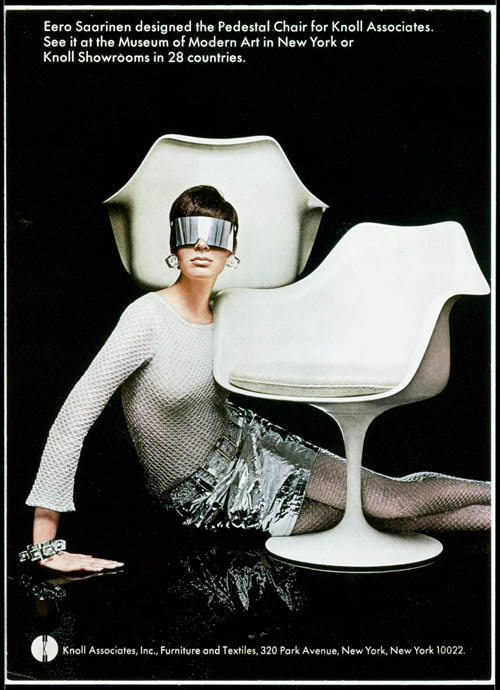
A Knoll International advertisement for the Saarinen Tulip furniture collection


